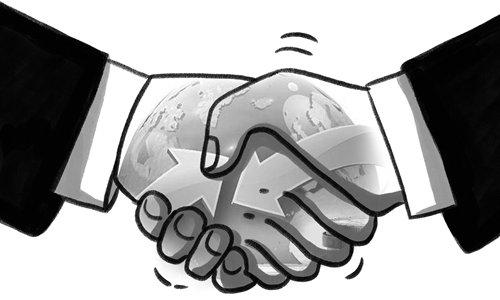
Illustration: Liu Rui/GT
My arrival in Jakarta on November 26 was not smooth with two aborted landings and a diversion to Surabuya 600 kilometers away due to heavy rain. When the weather improved, I was flown back to the Indonesian capital. A friend joked, "You earned. One ticket, three flights." So there can be several ways of looking at something. The same is true of relations between China and Indonesia.
In December 2015, I was invited to attend the cocktail party at the G20 Summit in Antalya, Turkey, as part of a team of think-tank members and met Indonesian President Joko Widodo, who elegantly stood by. We talked and took a photo. What impressed me most were his words about China, which he said is very important to Indonesia. Today, standing here, the most important thing I want to say is that Indonesia is also very important to China.
Indonesia is indeed very quiet, refined and peaceful, but the world should know that it is on way to becoming a global power. It is the world's fourth most populous nation, largest archipelagic country and one of the 10 largest nations in the world. Among G20 members, China, India and Indonesia are the three fastest growing economies. But Indonesia is not as frequently in the news as China and India.
Indonesia's current GDP is about $1 trillion, more than that of developed nations such as Spain and the Netherlands, accounting for about 40 percent of all ASEAN countries. What is even more enviable is that Indonesia is a very young country with more than 50 percent of the population under the age of 30, with an average age of only 25. It is important to know that the median age in OECD countries is about 45. In some northern European countries it is 49, making developed countries too old in comparison to Indonesia.
Sixty percent of Indonesia's economic growth is driven by domestic consumption, making it a huge consumer market. In 2014, Widodo announced that he aimed to transform Indonesia into a "global maritime axis," unleashing the country's potential on the path to becoming a global power. As a Chinese scholar, I have always believed that the 21st century is the Asian century, at least driven by three carriages of China, India and Indonesia (and ASEAN).
On October 3, 2013, Chinese President Xi Jinping specially delivered a speech during his visit to Indonesia, proposing the "21st Century Maritime Silk Road." It is also known as the Belt and Road and is now the most important foreign policy initiative of China. During his China visit, President Widodo made it clear that the 21st Century Maritime Silk Road is compatible with Indonesia's maritime power strategy. Because of the efforts of the leaders of the two countries, bilateral relations are at their best in history.
Since 2013, China has been Indonesia's largest trading partner. In 2016, China became the largest market for Indonesian exports. In the first half of 2018, China's two-way trade with Indonesia increased 28 percent year-on-year.
In the past five years or so, China has jumped from Indonesia's 12th largest source of foreign capital to the third largest, after the United States and Japan. China is also the fastest-growing country in infrastructure construction in Indonesia. There are reasons to believe that in the next 10 years China will become the No.1 source of foreign investment in Indonesia.
In 2016, China became the largest source of tourists to Indonesia for the first time. Bali in Indonesia is one of the most sought-after destinations in China. For the Chinese, the Indonesian people's peace-loving nature and family values are consistent with the values of the Chinese society.
But are there areas of improvement?
First, China and Indonesia need increased strategic trust to build a more lasting peace and prosperity along the western Pacific coast. Indonesia, as a regional power, has not yielded to provocation by some large countries. This is what the Chinese society appreciates. On the South China Sea issue, China and Indonesia need to have more policy coordination, maintain the continuity of China's policies and accelerate the negotiation on the South China Sea Code of Conduct.
Indonesians should understand that China's rise is different from the West's, which rose amid conflicts and wars in the past 500 years. China is striving to resolve differences and wants to achieve its rise in a peaceful way. Trust between China and Indonesia is crucial in the fastest growing region of the world.
Second, China and Indonesia should have more personnel to promote further understanding and integration. President Widodo hopes that Indonesia will become a global tourist country, and the number of foreigners who travel to Indonesia in 2019 will reach 20 million, including 10 million from China. Currently, the number of tourists from China has achieved only a third of the target. We must know that China has more than 130 million people traveling abroad each year, but Indonesia only accounts for less than 2 percent. How to attract more Chinese tourists? Social awareness, better tourism infrastructure, and service support are needed for cooperation between the two countries.
Third, China and Indonesia can promote more complementary industries in minerals, fisheries, manufacturing and agriculture to better realize the development of the two countries and the China-ASEAN community with shared future. While Indonesia has abundant mineral resources such as palm oil, coal, nickel, natural gas and oil, China can increase its import of resources. Indonesia needs a lot of capital and technology for the development and utilization of resources, and China can provide assistance in mining. The equatorial country has fertile land and abundant fishery resources, but the grain output is not high. China is willing to provide better technology for agriculture and fisheries. China's manufacturing industry has moved to Southeast Asia in large numbers. Indonesia may wish to communicate with China more on policy support and financing services to give the employment market a boost.
Fourth, China and Indonesia should increase economic cooperation in infrastructure investment. Although I came to Jakarta for the first time, I soon found that the city was congested, with high logistics cost, bad air quality and slow internet. China should increase infrastructure investment in Indonesia. "To get rich, to build roads first" is an important experience in China's 40 years of reform and opening up.
Jakarta is a dynamic city in a thriving country. Maintaining mutual trust and cooperation, China and Indonesia will surely make greater contributions to the stability of the country, region and world peace.
The author is executive dean of the Chongyang Institute for Financial Studies at Renmin University of China. The article is an excerpt of his speech at the China-Indonesia Dialogue held in Jakarta on Tuesday. opinion@globaltimes.com.cn

